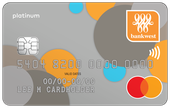Want to take your Australian credit card with you on a trip to Thailand?
Australian credit cards work in Thailand, but there are fees to be aware of. The information below will help you to understand how they might apply.
Save up to 3% per transaction
Credit cards with no Thailand currency conversion fee

Not available for application via this website
Balance transfer
24 months at 0% p.a.
Purchase rate
12.99% p.a. ongoing
Interest-free days
55 days
Annual fee
$59.00 p.a. ongoing
Highlights
- Get 0% p.a. interest on balance transfers for 24 months, with a 3% balance transfer fee (then 12.99% p.a. thereafter).
- No foreign transaction fees.
- Plus, complimentary overseas travel insurance for you and your family.
Pros
Cons

Not available for application via this website
Balance transfer
6 months at 0% p.a.
Purchase rate
6 months at 0% p.a.
Interest-free days
55 days
Annual fee
$0.00 p.a. ongoing
Highlights
- 0% p.a. for 6 months on purchases and balance transfers, with a 3% balance transfer fee. (Reverts to 18.99% p.a. thereafter.)
- No foreign transaction fees, including when you're shopping at an overseas online store.
- No annual fee to pay for the life of the card.
- Put up to five eligible purchases on an interest-free payment plan with Easy Instalments.
- Credit limits start from a minimum of $6,000.
Pros
Cons
Thinking of hitting the shops?
Potential fees when shopping with a credit card in Thailand
When shopping in Thailand with an Australian credit card, remember that there may be conversion and transaction fees on top of the price paid.
- Currency conversion fee. Due to the conversion from Thai baht to Australian dollars, you could be charged up to $9 in currency conversion fees if you spend the equivalent of $300 on your credit card in Thailand.
- Merchant’s currency conversion fee. Choosing to pay in Australian dollars means you may be charged an additional fee for dynamic currency conversion. This makes paying in Australian dollars more expensive than paying in Thai baht.
Need to pay with cash?
Using a credit card to get cash in Thailand
Credit cards are widely accepted in Thailand. However, it can be quite expensive to withdraw cash from an ATM with a credit card. Here's a breakdown of the costs you can expect.
- Overseas ATM withdrawal fee. The local ATM network may charge you a fee if you use your Australian credit card to withdraw cash from an ATM in Thailand.
- Cash advance fee. You'll typically be charged a one-time fee of between 1%-3% when you withdraw money from an ATM or bank overseas with your credit card.
- Cash advance rate. If you withdraw cash from your credit card, you’ll be charged interest at the rate for cash advances, which is usually higher than the purchase interest rate. Most cards have no interest-free period on cash advances either.
Want more help?
FAQs
Do I need to notify my credit card issuer about taking my card to Thailand?
Although it is not mandatory, many credit card issuers prefer to know in advance that you will be taking your card with you. If you do not notify them, it is more likely that your card will be blocked for suspected fraudulent activity until you do notify them.
Is it safe to use a credit card in Thailand?
Yes, it is safe to use a credit card in Thailand. However, you should take the same precautions as you would when at home.
What credit cards are accepted in Thailand?
Credit cards from American Express, Mastercard, and Visa are widely accepted, although acceptance varies depending on the merchant.
Is it better to pay in Thai baht or Australian dollars in Thailand?
It is generally cheaper to pay in the local currency. If offered the choice between paying in Thai baht or Australian dollars, choose to pay in Thai baht.
Do contactless credit card payments work in Thailand?
Yes. You can use contactless cards to pay wherever contactless payments are accepted.
Can you earn points on what you spend with a credit card in Thailand?
Yes. Depending on your card, you may even earn reward points at a higher rate per dollar spent while in Thailand.
What do I do if I lose my credit card in Thailand?
If you lose your credit card, call your bank and report it as lost. They can issue a replacement card and deliver it to your address in Thailand.
Need a new credit card?
Find a better credit card on Finty
- Compare credit cards from leading banks.
- Get a credit card with lower interest and better rewards.
- Make an informed decision with our detailed reviews.
